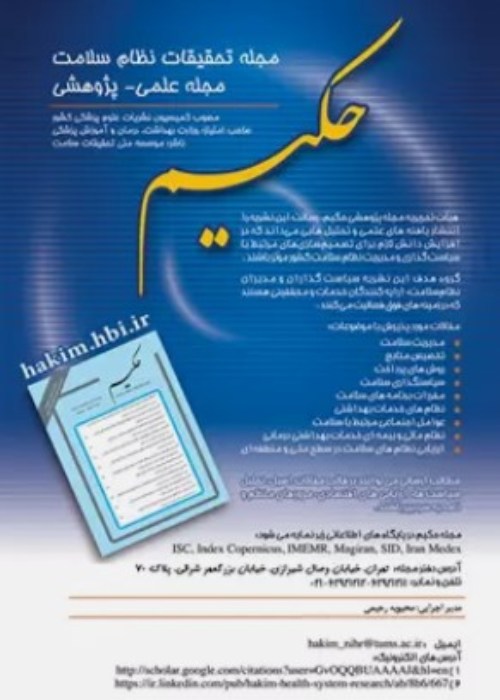Qualitative assessment of dimensions and degree of autonomy granting to university hospitals
Author(s):
Jafari Sirizi M. , Rashidian A. , , Abolhasani F. , Mohammad K. , Yazdani Sh , Parkerton P. , Yunesian M. , Akbari F. , Arab M.
Abstract:
Introduction
The aim of this study was to determine the key organizational dimensions that influence the autonomy of university hospitals and the level of granted autonomy in each dimension. Methods
Six hospitals were randomly selected from those affiliated with three medical universities of Tehran, Iran and Shahid Beheshti. In this qualitative study, we interviewed 27 hospital managers (response rate of 82%). The semi-structured interview guide was developed based on the results of four initial in-depth interviews and the organizational reform model of the World Bank. We used the framework method for the analysis of qualitative data. Results
Nine themes were identified as the key factors influencing hospital autonomy: decision right in strategic management, decision right in human resources management, decision right in financial management, decision right in physical resources management, product market exposure, procurement market exposure, financial residual claim, governance arrangements and accountability mechanisms, and social functions of the hospitals. Limited decision rights in strategic, human resources, and physical resources management were granted to hospitals. Hospitals were not the financial residual claimant, but were exposed to competitive product market. Autonomy was limited regarding the procurement market. Governance systems were hierarchical and accountability mechanisms were supervisor-supervisee oriented. Some of the social functions of the hospitals were defined, but the expenses of these functions were not totally reimbursed by the government and the insurance industry. Conclusion
The autonomy granted to the hospitals is unbalanced and paradoxical. More decision rights should be granted for management of strategic, human resources and physical resources as well as hospitals entry to the procurement market. Hospitals need to be the financial residual claimant. The hierarchical administrative systems should be transformed to cooperative ones. Instead of supervisor-supervisee oriented control measures, Ministry of Health and Medical Education needs more regulatory mechanisms for controlling hospitals’ performance and social functions.Language:
Persian
Published:
Hakim Health Systems research journal, Volume:11 Issue: 2, 2008
Page:
59
magiran.com/p581679
دانلود و مطالعه متن این مقاله با یکی از روشهای زیر امکان پذیر است:
اشتراک شخصی
با عضویت و پرداخت آنلاین حق اشتراک یکساله به مبلغ 1,390,000ريال میتوانید 70 عنوان مطلب دانلود کنید!
اشتراک سازمانی
به کتابخانه دانشگاه یا محل کار خود پیشنهاد کنید تا اشتراک سازمانی این پایگاه را برای دسترسی نامحدود همه کاربران به متن مطالب تهیه نمایند!
توجه!
- حق عضویت دریافتی صرف حمایت از نشریات عضو و نگهداری، تکمیل و توسعه مگیران میشود.
- پرداخت حق اشتراک و دانلود مقالات اجازه بازنشر آن در سایر رسانههای چاپی و دیجیتال را به کاربر نمیدهد.
In order to view content subscription is required
Personal subscription
Subscribe magiran.com for 70 € euros via PayPal and download 70 articles during a year.
Organization subscription
Please contact us to subscribe your university or library for unlimited access!



